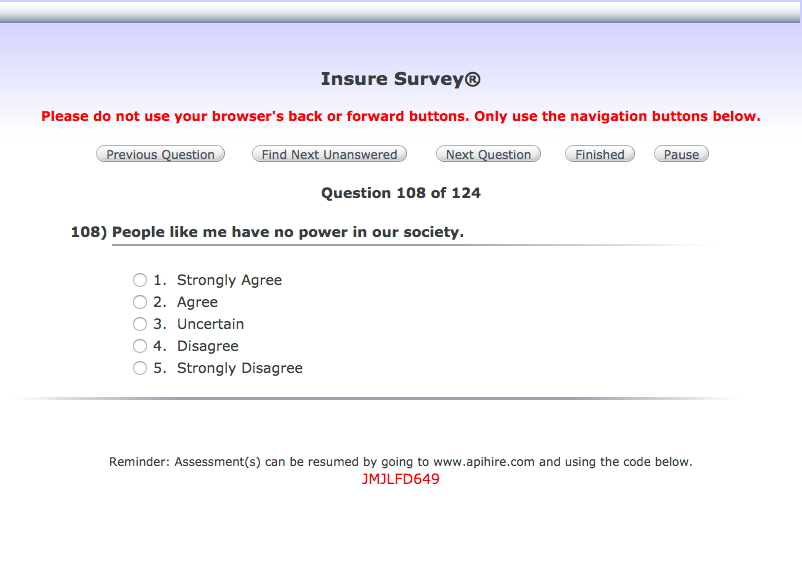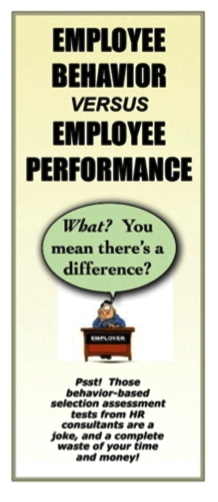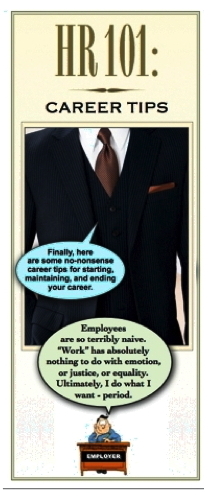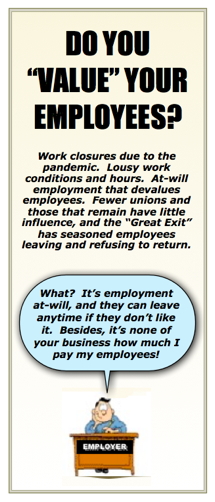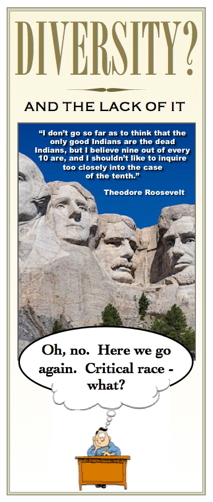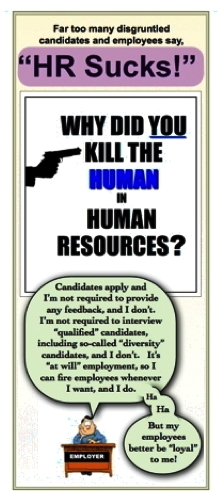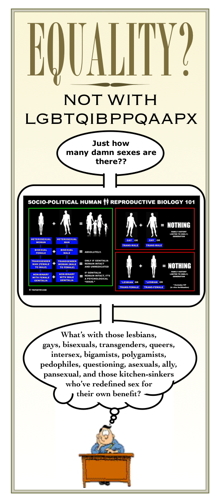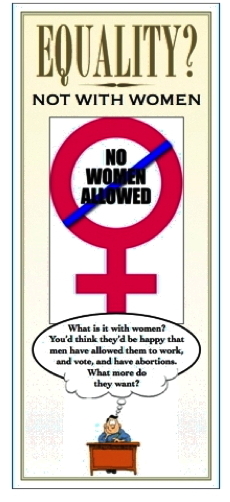Think for a minute, as represented by the exhibits below, given the history and perpetual status of the overwhelming majority of Black people in the United States, how exactly is an individual in a protected class (minorities, women, disabled, etc.) supposed to honestly interpret and respond to the aforementioned question without being "assessed" for "feeling" oppressed or depressed, or worse, being angry or in denial about their place in "our" society?
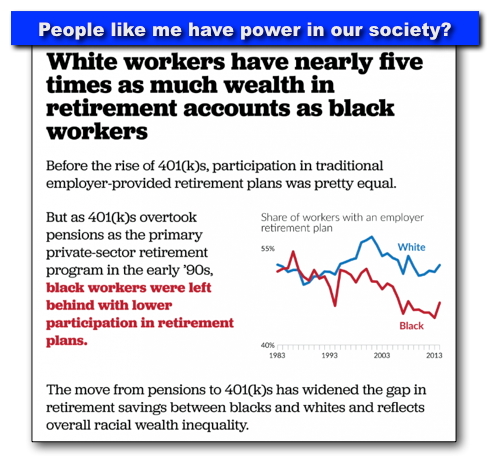 |
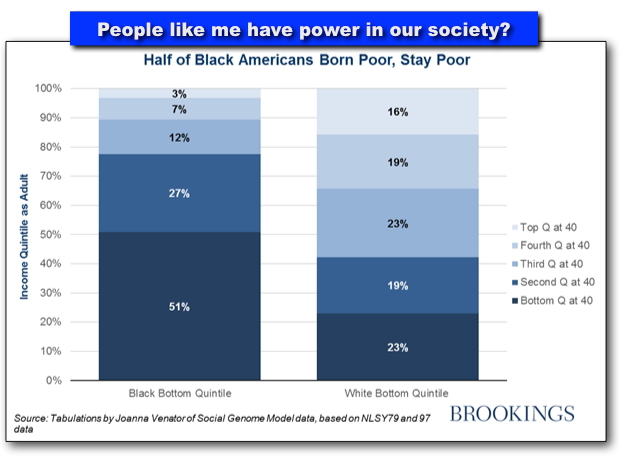 |
Likewise, given the history and perpetual status of the overwhelming majority of women in the United States, how exactly is a woman supposed to honestly interpret and respond to the aforementioned question without being "assessed" for "feeling" oppressed or depressed, or worse, being angry or in denial about her place in "our" society? Or perhaps, the real purpose of this question is to make sure women and minorities "know" their pre-determined place in society.
|
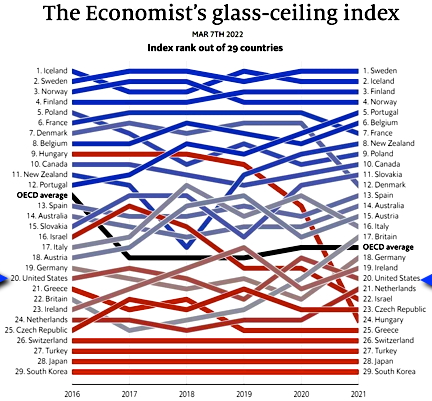 |
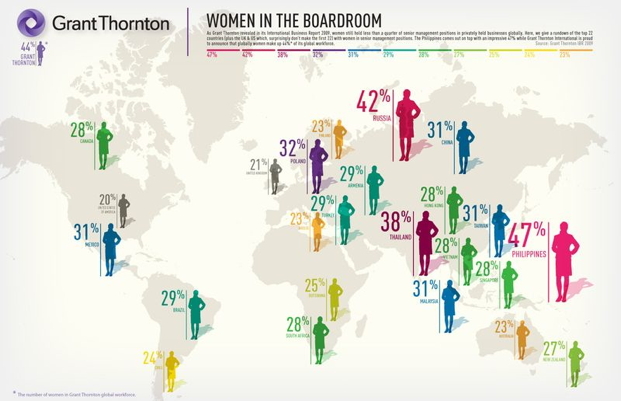 |
Women are heavily underrepresented in high-level leadership positions, only 6% of CEOs at S&P 500 companies are women. Why is there a greater percentage of women in corporate and governmental boardrooms in Russia (42%), China (31%), Canada (28%), Australia (23%), Brazil (29%), Mexico (31%), and throughout other countries in Europe and Asia than in the United States (20%)? |
STATEMENT: People like me have no power in our society.
What does the aforementioned statement have to do with the actual "job," or asking similar questions like:
> To have real power in our society your employer must pigeon-hole your entire existence, including non-work related values and interests, into a consultant-driven, predetermined, pseudo-psychological assessment that has absolutely nothing to do with the actual performance of the posted essential job functions.
_ Strongly agree
_ Agree
_ Uncertain
_ Disagree
_ Strongly disagree
> To have real power in our society you cannot be a woman.
_ Strongly agree
_ Agree
_ Uncertain
_ Disagree
_ Strongly disagree
>To have real power in our society you cannot be a minority.
_ Strongly agree
_ Agree
_ Uncertain
_ Disagree
_ Strongly disagree
> To have real power in our society you must be lazy and let the government take care of you.
_ Strongly agree
_ Agree
_ Uncertain
_ Disagree
_ Strongly disagree
> To have real power in our society you cannot be physically disabled or mentally disabled, or appear to be.
_ Strongly agree
_ Agree
_ Uncertain
_ Disagree
_ Strongly disagree |
|
> To have real power in our society you must have progressive values.
_ Strongly agree
_ Agree
_ Uncertain
_ Disagree
_ Strongly disagree
> To have real power in our society you must adopt a LBGT+ lifestyle.
_ Strongly agree
_ Agree
_ Uncertain
_ Disagree
_ Strongly disagree
> To have real power in our society you must be a social justice warrior.
_ Strongly agree
_ Agree
_ Uncertain
_ Disagree
_ Strongly disagree
> To have real power you must be morbidly overweight or obese like the overwhelming majority of people in our society.
_ Strongly agree
_ Agree
_ Uncertain
_ Disagree
_ Strongly disagree
> To have real power in our society you must be White and male and have a truck load of money.
_ Strongly agree
_ Agree
_ Uncertain
_ Disagree
_ Strongly disagree |
Unlike the Uniform Guidelines on Employee Selection, which is specific to the actual work performed by the candidate/employee, the Johnston Assessment (JA) is behavior based, overtly subjective, and does not assess the knowledge or proficiency actually required to perform the posted essential job functions. Keep in mind, the "relationship" between the employer and employee is not behavior-based, but performance-based; it's an adult-to-adult relationship, not parent to child. "Employment" is a professional relationship, where professional work-related standards of courtesy, congeniality, diplomacy, and sometimes, an employment contract-defining morals clause are inherent job standards, but bereft of any actual emotional attachment. Why?
In this professional work environment, your employer does not monitor how you behave, as if you’re a child. For example, when a minor child throws a tantrum and physically hits another, the child is admonished, possibly suspended. Conversely, an adult who physically hits another adult has committed an assault and is subject to immediate termination for violation of company policy, and subject to civil litigation and criminal prosecution. Your employer is not your parent to coddle YOU, or to advocate or support YOU as a friend.
JA and other behavior-based assessments often require the candidate to select from only 1 or 2 choices, "the least objectionable choice," when an actual and better unlisted “work related” option(s) exist beyond the scope of the question. Forcing a candidate to repeatedly select the least-worst option, an option that has absolutely nothing to do with the performance of the actual essential job functions, does not validate any aspect of the candidate's proficiency or subject matter expertise in "performance" of the essential job functions. JA and other behavior-based assessments do not function as a linear assessment of work-related “performance,” but do function as a consultant-driven behavior-based assessment at the expense of the employer and at the detriment of the candidate.
QUESTION: Why would an employer waste time conducting non-work-related "behavioral assessments" only to subsequently discover the candidate lacks subject matter expertise to perform (not behave), but to perform the actual essential job functions?
OBSERVATION: It can be perceived as somewhat disingenuous to suggest "expertise" in recruitment and selection when the validation of a candidate's skills, knowledge and proficiencies is prolonged, protracted, or even worse, indecisive.
FACT: In the absence of the work being performed in an actual medical setting and/or by a licensed medical professional: (1) neither the employer or the immediate hiring authority is a licensed psychiatrist or psychologist, and (2) the essential job functions do not require the use of psychiatric or psychological skills, knowledge, or proficiencies. Accordingly, due to considerable case law, during the past forty-(40) years the overwhelming majority of employers abandoned behavior-based assessments to avoid claims of discrimination and potential litigation. Unfortunately, some employers, and consultants out for a fast buck ignore or forget the past, especially when doing so maintains the "status quo." The transition from AA/EEO/ADA to the Johnny-come-lately "DEI" space has created a bunch of pseudo-DEI experts who literally don't have a clue about "real world" DEI, which as validated by EEO-1s and EEO-4s, except for a few tokens, nothing has changed:
The New York Times: Faces of Power: 80% Are White, Even as U.S. Becomes More Diverse
https://www.nytimes.com/interactive/2020/09/09/us/powerful-people-race-us.html
Consistent with the Uniform Guidelines on Employee Selection (criterion-related, content, and construct validity), my pre-employment "work-related assessment" requires the candidate to validate subject matter expertise actually "doing the work" in three specific dimensions: (1) subject matter expertise and compliance; (2) presentation; and (3) goal setting and achievement. The aforementioned process enables the recruiter to immediately filter-out candidates who lack subject matter expertise. For example, in compliance with the UGES, I require candidates for a "recruiter position" to complete the following pertinent "work-related" assessment; all of which can occur when the candidate submits an online job application via the employer's HRIS/ERP applicant tracking portal or through third-party online vendors such as Indeed.com:
Dimension 1: (Knowledge and Compliance): Properly categorize and sort the attached Excel spreadsheet of employee demographic data in compliance with EEO-1 reporting, to include separate columns for percent of workforce and numerical totals for each demographic. Plus, based on the EEO-1 report, suggest if and where the employer might be at-risk for being subject to a Conciliation Agreement with the OFCCP.
Dimension 2: (Presentation): Submit a five-(5) minute video presentation both discussing and showcasing an actual ADA workplace accommodation, to include: type of disability; all related expenses; steps to achieve implementation; coordination with third-party entities, etc.
Dimension 3: (Goal Setting and Achievement): Identify the salary inequity in the attached Excel spreadsheet, and detail specific steps to be taken to correct the inequity, the projected amount of time to correct the inequities, and the steps and time required to prevent subsequent inequities.
Noteably, an assessment based on whether or not "People like me have no power in our society," is not relevant, and most importantly, the employer is not wasting time and money conducting non-work-related "behavioral assessments" only to subsequently discover the candidate lacks subject matter expertise to perform (not behave), but to perform the actual essential job functions.
In summary, with regard to developing and executing a successful recruitment and selection campaign, please keep in mind:
1. Reynolds has robust experience designing selection assessment instruments and related tools in compliance with the Uniform Guidelines on Employee Selection (criterion-related, content, and construct validity).
2. Reynolds promoted 60% of all employees who immediately reported to him, and he's never terminated any of his reports for cause.
3. Reynolds has conducted thousands of recruitment campaigns and hired thousands of employees in compliance with the UGES, and has never terminated anyone he's hired for cause.
|

